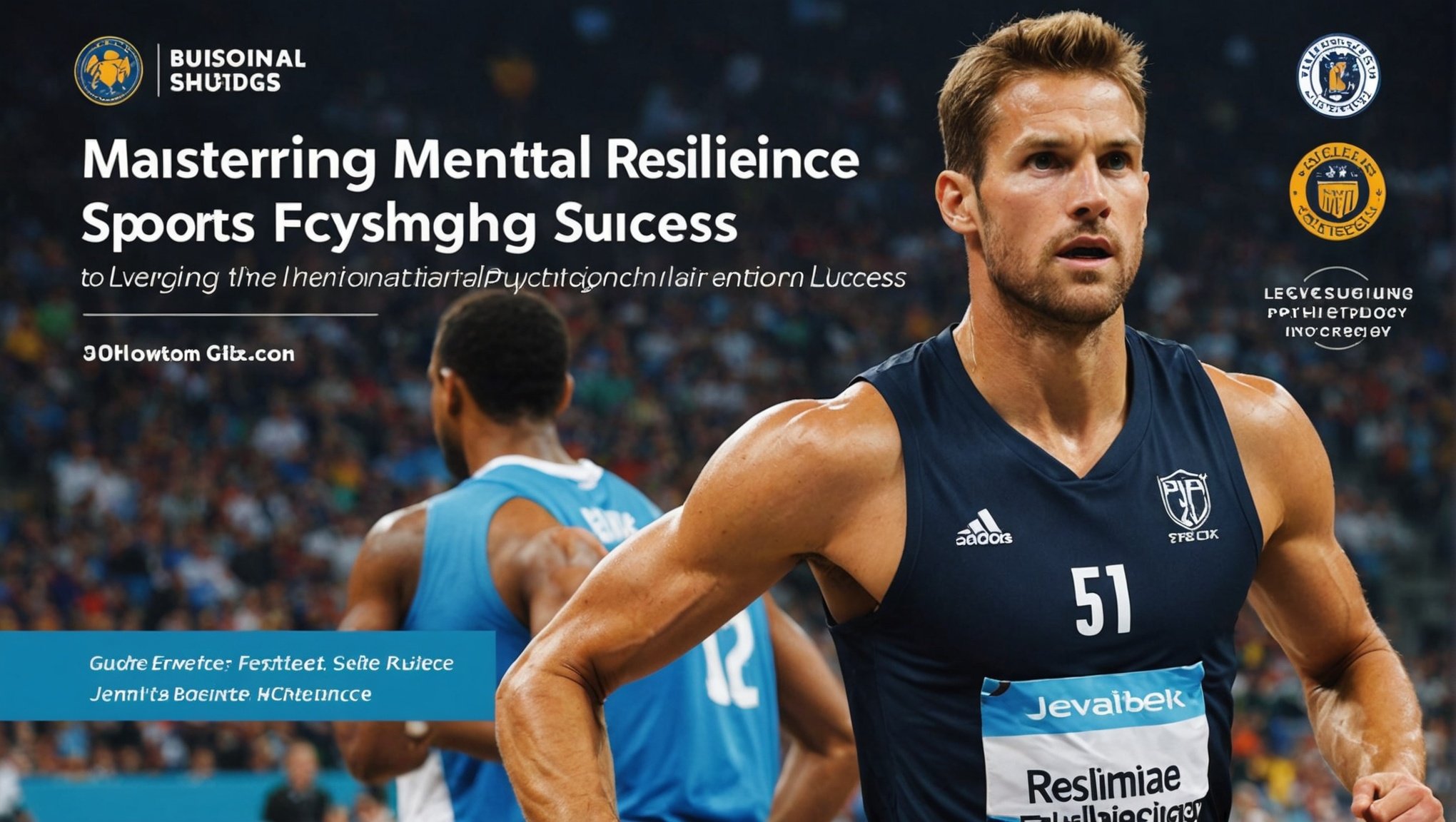Mastering Mental Resilience: Athletes’ Guide to Leveraging Sports Psychology for Success in International Competitions
Understanding Sports Psychology and Its Role in Athletic Performance
Sports psychology is a field that delves into the mental aspects of athletic performance, exploring how psychological factors influence an athlete’s ability to succeed. This discipline is crucial because it addresses the psychological barriers that can hinder athletes, helping them to overcome anxiety, stress, and pressure, especially in high-stakes international competitions.
At the heart of sports psychology is the concept of mental resilience, which refers to an athlete’s ability to maintain focus, adapt to challenging situations, and recover from setbacks. Mental resilience is vital for athletes competing at the international level, where the stakes are high and the pressure is immense. Athletes with strong mental resilience can better manage their emotions and maintain peak performance levels even under intense stress.
Have you seen this : Unlocking Peak Performance: The Role of Sports Nutrition in Athlete Success During Competitions
Techniques for Mental Conditioning
Mental conditioning is a cornerstone of sports psychology, focusing on strategies to enhance an athlete’s mental toughness and overall performance. Here are some key techniques that athletes can use to build their mental resilience:
Visualization Strategies
Visualization, or mental imagery, is a powerful tool in sports psychology. It involves creating vivid images in the mind to simulate the experience of competing. To effectively use visualization:
Also read : Essential Core Exercises for Cyclists: Injury Prevention Tips You Need to Know
- Relaxation: Begin with deep breathing exercises to calm the mind and body.
- Detailed Imagery: Picture the competition environment vividly, including sights, sounds, and even the feel of the equipment.
- Positive Outcome: Visualize successful execution of skills, focusing on achieving desired results.
- Consistency: Practice regularly to strengthen the mental-muscle connection.
Cognitive Techniques
Cognitive techniques play a crucial role in mental conditioning. These include:
- Self-Talk: Using positive affirmations to boost morale and concentration.
- Cognitive Restructuring: Changing negative thought patterns to more positive and constructive ones.
- Scenario Training: Simulating challenging situations that athletes might face in real competitions to prepare them for stress and unexpected events.
Mindfulness Practices
Mindfulness practices such as meditation and breathing exercises help athletes manage anxiety and maintain a calm state of mind. These practices can be integrated into daily training routines to enhance overall mental well-being and performance.
Building a Support System
Creating a robust support system is essential for athletes aiming to achieve peak performance. This system includes coaches, teammates, and family, all of whom play a pivotal role in an athlete’s mental preparedness.
Role of Coaches
Coaches provide guidance and strategic insights, helping athletes to refine their skills and build confidence. They can also offer psychological support, helping athletes to manage stress and pressure.
Team Dynamics
Teammates contribute to team dynamics, fostering camaraderie and mutual encouragement. This social support boosts morale and resilience, helping athletes to perform better under pressure.
Family Support
Family members offer emotional support, ensuring athletes maintain a balanced perspective amidst the pressures of competition. Open communication channels within the family can enhance trust and ensure that everyone is aligned towards common goals.
Overcoming Imposter Syndrome and Other Psychological Barriers
Imposter syndrome is a pervasive issue that can hinder even the most skilled and dedicated athletes. It is characterized by chronic self-doubt and a persistent fear of being exposed as a “fraud,” despite external evidence of competence.
Strategies to Overcome Imposter Syndrome
Here are some strategies to help athletes overcome imposter syndrome:
- Acknowledge Your Feelings: Recognize and acknowledge feelings of self-doubt. Understand that these feelings are common and do not define your abilities or worth as an athlete.
- Accept All Thoughts: Be open and accepting of both helpful and unhelpful thoughts. Acknowledge thoughts like “I’m not good enough” without judgment.
- Celebrate Your Achievements: Reflect on and celebrate your accomplishments, no matter how small. Keeping a journal of your successes can help reinforce your competence and boost your confidence.
- Seek Feedback and Support: Surround yourself with a supportive network of coaches, teammates, and mentors. Constructive feedback from trusted individuals can provide valuable perspective and help you see your strengths more clearly.
- Set Realistic Goals: Set achievable, realistic goals that align with your abilities and progress. Break larger goals into smaller, manageable steps to maintain a sense of accomplishment and motivation.
- Practice Self-Compassion: Treat yourself with the same kindness and understanding that you would offer to a friend. Acknowledge that everyone makes mistakes and that setbacks are a natural part of the growth process.
- Focus on the Process: Shift your focus from the outcome to the process. Embrace the journey of improvement and the effort you put in, rather than solely fixating on results.
The Importance of Mental Health in Sports
Mental health is a critical aspect of an athlete’s overall well-being and performance. Ignoring mental health can lead to significant barriers to success and fulfillment.
Recognizing the Signs of Mental Health Issues
Athletes and their support systems should be aware of the signs of mental health issues such as anxiety, depression, and burnout. For instance, when Simone Biles pulled out of the Olympics in 2020, it highlighted the importance of prioritizing mental health in the sports industry.
Seeking Professional Guidance
Athletes should not hesitate to seek professional guidance from performance psychologists or counselors. These professionals can provide tailored strategies and support to address mental health issues effectively.
Practical Strategies for Building Mental Resilience
Here are some practical strategies that athletes can use to build their mental resilience:
The 40% Rule
David Goggins’ “40% Rule” suggests that most people quit when they’ve only tapped into 40% of their potential. Athletes can push beyond this perceived limit by recognizing their untapped strength and pushing through mental and physical limits.
Embracing Discomfort
Embracing pain and discomfort as a catalyst for growth is a theme emphasized by David Goggins. This mindset helps athletes to rewire their brains and continually improve, regardless of external conditions or motivational state.
Goal Setting
Setting clear, achievable goals is crucial for maintaining focus and motivation. Athletes should break larger goals into smaller, manageable steps to maintain a sense of accomplishment and progress.
Self-Talk and Positive Affirmations
Using positive self-talk can significantly boost morale and concentration. Athletes should practice positive affirmations regularly to reinforce a positive mindset.
Case Studies and Success Stories
Many successful athletes attribute their success to rigorous mental conditioning regimes. For example, Olympic champions often highlight the importance of mental preparation in their training programs. Here is a table comparing the mental preparation strategies of different athletes:
| Athlete | Mental Preparation Strategies | Outcome |
|---|---|---|
| David Goggins | Visualization, Embracing Discomfort, Self-Discipline | Achieved elite performance in multiple ultra-endurance events |
| Simone Biles | Focus on Mental Health, Seeking Professional Guidance, Team Support | Maintained peak performance despite high pressure and mental health challenges |
| Paralympic Athletes | Cognitive Restructuring, Scenario Training, Mindfulness Practices | Overcame significant physical and mental barriers to achieve success |
Mastering mental resilience is essential for athletes competing at the international level. By understanding and leveraging sports psychology techniques, athletes can enhance their performance, manage stress and pressure, and achieve long-term success.
Key Takeaways
- Mental Resilience: Develop strategies to maintain focus, adapt to challenging situations, and recover from setbacks.
- Support System: Build a robust support system including coaches, teammates, and family.
- Mental Health: Prioritize mental health and seek professional guidance when needed.
- Practical Strategies: Use visualization, self-talk, goal setting, and other cognitive techniques to enhance mental toughness.
- Embracing Discomfort: View pain and discomfort as catalysts for growth and improvement.
By integrating these strategies into their training and competition preparation, athletes can perform at their best, even in the most high-pressure environments.
Final Thoughts
As Dr. Cassidy Preston of CEP Mindset emphasizes, “Consistent Elite Performance” is not just about physical conditioning but also about mental preparation. Athletes who focus on developing their mental resilience are better equipped to handle the psychological demands of international competitions and achieve lasting success.
In the words of David Goggins, “Your body can handle anything if you let your mind keep up.” By mastering mental resilience, athletes can unlock their full potential and perform at peak levels when it matters most.











